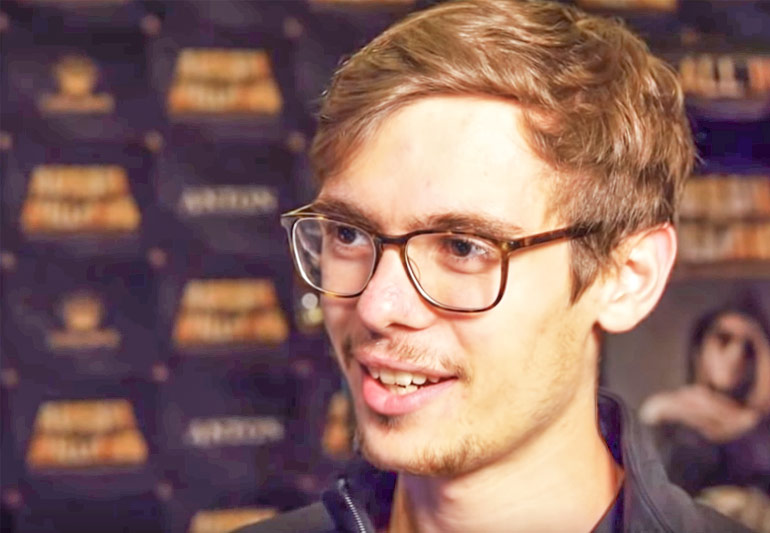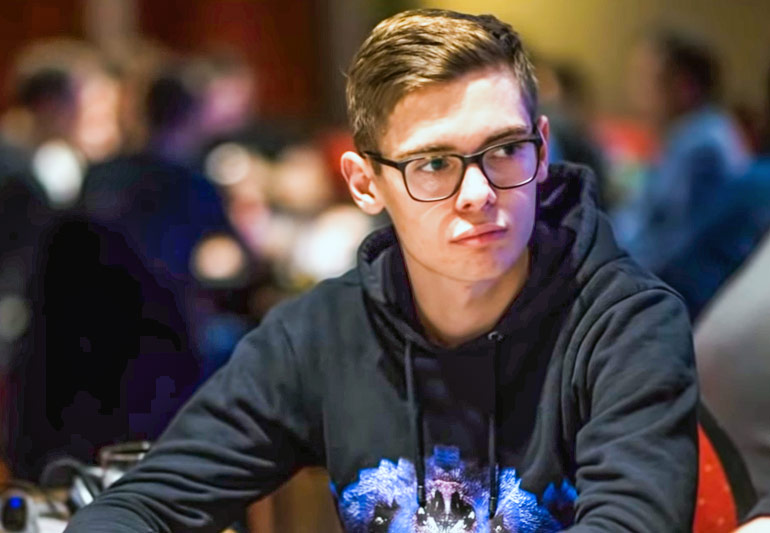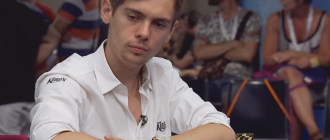In 2012, a 19-year-old German showed up at the main event of the Deepstack Series. The kid paid $500 for the buy-in and finished second, winning €15,320 ($16,859). That was the player’s first live tournament, and not many could have guessed at the time that that kid, named Fedor Holz, would go on to become one of the greatest poker players ever.
It soon kicked off for Holz. Not long after, he started showing up at many a tournament, with his rewards scaling up exponentially. His first bigger haul was two years later when he finished top at the World Championship of Online Poker. Holz, the winner of the championship, netted in $1.3 million. In his first showing at the WSOP, he ended up at the main event where he came out 25th, cashing in $262,574.
In 2015, Holz earned his first (and only so far) WSOP bracelet, when he earned $4,981,775 for finishing top at the High Roller for One-Drop event. After that, he kept winning and was worth over $20 million by the time he was just 22 years old!
Today, he’s seventh on the list of all-time highest earners and is the richest-ever German to play poker professionally. So how does a man reach total live earnings of $32,556,377 while being 26 years old? What does it take to reach that level, and what do you need to do to elevate your game to such heights? Well, let’s hear it from the man himself.
Table of Contents
Don’t Holz Your Tongue
Fedor Holz has started his own YouTube channel, which goes in line with his Twitch activity, where he streams his online poker gaming routines (kids these days, right?). One of the first things he uploaded on the popular video platform was an interview with his fans — a Q&A session. During the video, Holz talked about a variety of topics, starting… at the beginning.
One of the first things he addressed were his early poker days and how he managed to grow. He specifically mentioned two people who had a big influence on his development. Namely, Holz recalled his time at Cherry Island, an island located north of Toronto, Canada. There, he spent four weeks doing nothing but playing poker with eight other players in order to share knowledge and experience. Out of the nine-man group, Holz singled out Steffen Sontheimer as someone who he learned the most from. In Holz’s words, Sontheimer taught him a lot about how to use the poker HUD. Additionally, and more importantly perhaps, Sontheimer provided some insight into a more strategic and mathematical approach to the game. Holz praised his compatriot for allowing him to see the game more rationally and to think through every move on a more advanced level.
Watching Others
Another person who also had a huge influence on Holz and his style is Phil Galfond. Although Holz passed Galfond a long time ago in the number of successful tournaments and the amount of money earned, he still holds Galfond highly. He said that, some time ago, he used to watch Galfond play online (alias OMGClayAiken), and he especially focused on videos in which Galfond would explain his thought process behind the plays he made. Holz said that it blew his mind how the American saw and understood poker in a unique way, always making it fun for spectators.
WSOP Experience
Holz took the opportunity to talk more about his experience at the WSOP and what it’s like to be there as a player, as opposed to just watching it at home. He said that, naturally, his feelings and approach to the WSOP changed over the years as he had different motivations and aspirations while he was there.
For instance, Fedor recalled his first visit there (in 2015), and the feeling that the series couldn’t come soon enough. He was relentlessly waiting for it to happen and for him to make his first appearance. What Holz enjoyed the most about it, in his own words, was the grind. It was that feeling of spending hundreds of hours playing poker on the highest level, sitting at the same table with the big boys — people you used to watch on your TV making plays you didn’t see were there. That grind was so exciting for the up-and-coming Holz because he felt he was getting more out of it than just potential prize money.
However, over time, his attitude changed a bit. The grind became too grindy, so to speak. Hundreds and hundreds of hours of playing are interesting up to a certain point, but not so much if you already have thousands of playing hours under your belt. At some point, Holz started going there more for the camaraderie of it than the tournament itself. As time went by and Holz frequented more and more tournaments, he became friends with a lot of other players. So even if he didn’t particularly enjoy the WSOP (and Las Vegas, for that matter) as he used to, Fedor was able to find a balance between having a great time with his friends and playing poker.
Calling It Quits
But at some point, even the fun times he had on the side weren’t enough of a motivation for him to keep going. As expected, the unwillingness to commit to the aforementioned grind became too burdensome. According to the man himself, he stopped finding the fun side of it, and it felt more of a job than he liked. Holz reached the point of the WSOP being more of a nuisance and an obligation than something he looked forward to months in advance.
That was the number one reason why Fedor stopped going to the WSOP, and presumably, why he stopped going to other tournaments as well as he formally retired in 2016 from professional poker.
Tilting Your Bankroll
During the Q&A, Holz also touched on the topic of managing your bankroll and how tilt could affect your expenditure. To Fedor (and pretty much every other pro), bankroll management and avoiding tilt is one of the most important concepts of the game. In his experience, tilt is probably the most dangerous to the player in the sense that it will take more money away from you than any opponent would. It’s paramount not to allow yourself to be tilted or let your focus be affected by any type of negative emotional reaction.
Anything even remotely close to tilting can get you to make bad calls, such as not being fully focused, being in the wrong mindset, or angry about your previous moves. Holz spoke about how much money he himself lost playing on while being tilted. Fedor finds that tilt is particularly dangerous in poker, compared to other games and professional decision-making in general. This is due to the magnitude and the multiplication of losses in poker that occur when you’re tilted or in a bad streak.
This is why Fedor highlights focus and working on yourself and your psychology. Doing mental exercises can help you learn how not to become tilted. Holz spent a lot of time getting himself to a level of calmness where he could avoid tilt and get an advantage over his opposition.
Bankroll Management
Fedor connected tilt with bankroll management. He talked about how he had to learn to remain patient at all times and not allow himself to become affected by emotions. Holz believes that every player should have some predetermined principles on bankroll management that they should never steer away from. For instance, Holz has a self-imposed rule never to spend more than 1% of his budget on any tournament he plays at regardless of how things are going for him — whether he’s winning or losing.
Other rules or principles are all related to self-control, basically. When you’re losing, you tend to take greater risks in order to recoup your money, and that’s what you should learn not to do. Holz talked about how he would put all of his bankroll into one tournament after a cycle of consistently losing money. That’s something you must definitely not repeat.
Are You Patient Enough?

While talking about managing your bankroll and your emotions, Holz singled out patience as one of the most important aspects of playing poker successfully. There’s a lot of difference between being a great theoretical player than when you start actually playing. Theoretically, you can know all about hand ranges, the calculations that go behind individual hands, and your probabilities. But all of that goes out of the window if you become flustered once you take center stage.
In Fedor’s experience, it’s the patience that allows you to succeed in transferring that knowledge of the game to actual real-life situations and apply it the best way possible. If you’re not able to remain calm and it all dissolves when you sit at a high-rolling table, then, it doesn’t really matter whether you’re technically good or not. Holz said that he found patience to be the most relevant when it came to executing in games. Moreover, he stated that patience was equally important when you needed to fight through a losing cycle by sticking to your long-term goals.
Doing Tournaments Full Time
This is a question that doesn’t take its time popping up whenever there’s something poker-related going on. If there’s a famous professional poker player doing a Q&A, you believe someone will show up with a trilby and a piece of paper behind their ear, asking if it is possible to play poker tournaments as a full-time job.
As Fedor put it, it’s a simple question with a simple answer — yes, you can (we bet you already know the first word of the next sentence)! BUT doing so is not as simple as the answer above. Holz believes that if you want to do it properly, you must have a professional attitude about it. You have to have a structured approach, so don’t do it until you know the answer to the following two questions: Why do you do it? How do you do it?
Holz advised players to define their goals before they went into pro tournaments. According to Fedor, you have to treat them like something that will be the main focus of your everyday life. If you want to go full time, then you mustn’t think of it as just something you’re killing time with on the side. You have to treat full-time playing like you would do it with any other full-time job, and you should devote time and energy to it.
All Work and No Play Makes Fedor What Kind of Boy?
There’s been a lot of talk about how much time you should allocate to studying the game rather than playing it. Fedor said that this was a trend that came to be fairly recently. Back in the day, when he was coming up (which was seven or eight years ago, mind you), players used to play all the time, without acknowledging the need to sit back and reflect upon their gaming. Holz and his group of friends started exchanging strategies and hand stories, so for him, it was about 5% study, 95% play.
Over the years, the trend has been going more and more into the direction of more studying and strategizing. Today, people are more willing to spend their time watching instructional videos, but Holz advised always to maintain a healthy balance between the two. Regardless of how helpful studying is, playing actual games and personally going through rounds is way more important. According to Holz, you should devote a third of your time to study, while two-thirds should go on playing.
What’s Pokercode All About?

Together with Matthias Eibinger, a pro player from Austria, Holz is launching Pokercode. Pokercode is an all-encompassing poker course with over 60 extensive lectures where you can learn all about the game and its many aspects. Holz’s idea is not only to have a theoretical approach, but also to go through actual rounds and analyze them.
They will talk about many different parts of the game, from how to act with regards to the size of big blinds to what your pre-flop game should consist of. Additionally, they have taken hundreds of gameplay hours that Holz and Eibinger went through, and in this course, Fedor will analyze them and show you what went wrong. Basically, they’ve set it up to be relevant for both cash games and tournament play.
Fedor also touched on the topic of price. Admittedly, it’s seemingly on the steep side as the access to the entire course would cost you $1,549. However, he justified this price by claiming that the course was amazing for players of varying skill range — novices, intermediate, and advanced players. So if you’re looking to learn the trade, get your skills up, or find that final push to reach the highest level, you’ll have something valuable in this course. This way, if you elevate your game by just a little, you’ll be able to get your money back in a few months’ time.
Holz said that you could also return to this course later in time when you became a better player because you would always find something new to introduce to your game. It’s worth at least checking it out!





